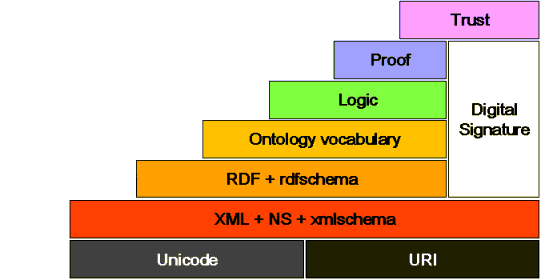Semantic web: Difference between revisions
Jump to navigation
Jump to search
(using an external editor) |
(using an external editor) |
||
| Line 14: | Line 14: | ||
A simplified picture of the Semantic web tower is: | A simplified picture of the Semantic web tower is: | ||
[[image:sw-tower.png|frame|none|The simplified semantic web tower]] | [[image:sw-tower.png|frame|none|The simplified semantic web tower]] | ||
See also the [[RDF]] article, e.g. for information about the "RDF bus". | |||
* Semantic web applications are usually built on top of [[RDF]], e.g. see [[FOAF]] as a relatively simple example | |||
* Semantic web applications built on top of [[RDF]], e.g. [[FOAF]] | |||
Alternatively, there are initiatives outside the W3C RDF framework, like: | Alternatively, there are initiatives outside the W3C RDF framework, like: | ||
| Line 37: | Line 37: | ||
* [http://www.w3.org/2001/sw/ Semantic Web]. W3C home page. (includes links to all standards, groups, and some publications). | * [http://www.w3.org/2001/sw/ Semantic Web]. W3C home page. (includes links to all standards, groups, and some publications). | ||
* [http:// | * [http://planetrdf.com/guide/ Dave Beckett's Resource Description Framework (RDF) Resource Guide]. This is probably the most complete index of documents. | ||
; Short Tutorials etc. | ; Short Tutorials etc. | ||
* [http://www.w3.org/RDF/Metalog/docs/sw-easy The Semantic Web Made Easy], W3C page, retrieved 16:04, 23 November 2006 (MET). | |||
; FAQs | ; FAQs | ||
Revision as of 16:04, 23 November 2006
Definition
- “The Semantic Web is a project that intends to create a universal medium for information exchange by putting documents with computer-processable meaning (semantics) on the World Wide Web.” Wikipedia: Semantic Web
Technology
People who work on the Semantic Web base their work on the famous "semantic web tower". Its major components are:
A simplified picture of the Semantic web tower is:
See also the RDF article, e.g. for information about the "RDF bus".
- Semantic web applications are usually built on top of RDF, e.g. see FOAF as a relatively simple example
Alternatively, there are initiatives outside the W3C RDF framework, like:
The relation to Web 2.0
Web 2.0 does incorporate some "semantics" but globally speaking it is much inspired by making it as simple as possible. E.g.
- Simple RSS (0.91, 2.0) instead of RSS 1.0 that was based on RDF
- Folksonomies instead of formal taxnomies metadata based on RDF semantics
- People-driven aggregation of knowledge (e.g. via syndication of the blogsphere) instead of smarter search engines. An exception are some of the best citation indexes that use both approaches.
Some examples
- FOAF ("Friends of a friend") is an RDF-based social software for social networks.
- Semantic Media Wiki] (At some DSchneider will make a test with this within this wiki)
Links
- Semantic Web. W3C home page. (includes links to all standards, groups, and some publications).
- Dave Beckett's Resource Description Framework (RDF) Resource Guide. This is probably the most complete index of documents.
- Short Tutorials etc.
- The Semantic Web Made Easy, W3C page, retrieved 16:04, 23 November 2006 (MET).
- FAQs
References
- Hendler, James, Berners-Lee, Tim and Miller, Eric "Integrating Applications on the Semantic Web," Journal of the Institute of Electrical Engineers of Japan, Vol 122(10), October, 2002, p. 676-680. HTML (Reprint).
- Horrocks, Ian; Bijan Parsia, Peter Patel-Schneider and James Hendler (2005). Semantic Web Architecture: Stack or Two Towers, in Francois Fages and Sylvain Soliman, editors, Principles and Practice of Semantic Web Reasoning (PPSWR 2005), number 3703 in LNCS, pages 37-41. SV, 2005.
Shadbolt, Nigel; Tim Berners-Lee and Wendy Hall (2006). The Semantic Web Revisited, by , IEEE Intelligent Systems 21(3) pp. 96-101, May/June 2006 PDF.
